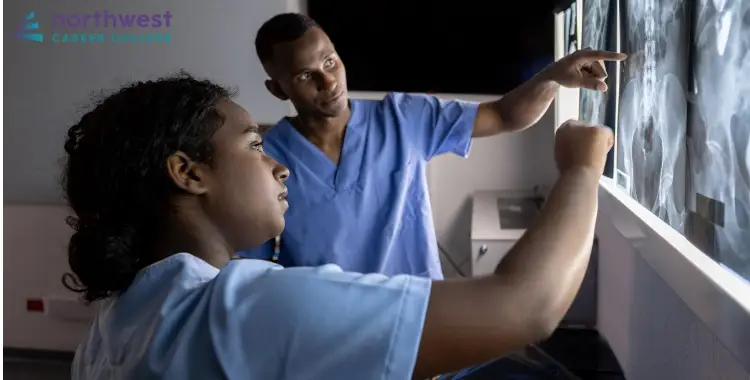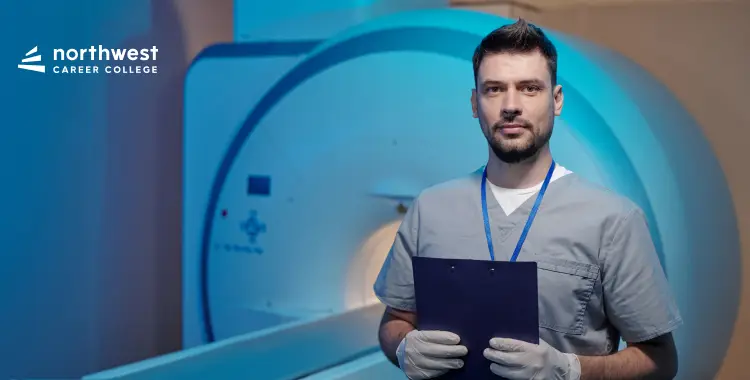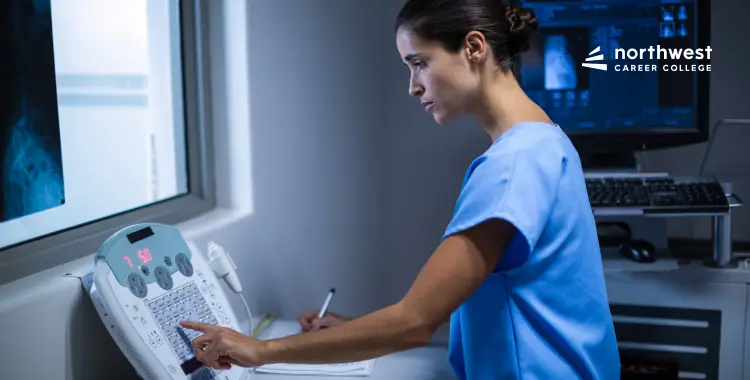Building a Strong Foundation: Essential Skills for Radiography Students
- June 3, 2024
- 3.6k views
- 3 min read
Are you considering a career in radiography? This field combines cutting-edge technology with patient care. It offers a challenging but fulfilling career path. Success in a radiography program requires specific skills that ensure proficiency in technical procedures and patient interactions.
In this blog post, we’ll explore the critical skills essential for thriving in a radiography program and how enrolling in Northwest Career College‘s Radiography Program can set you on the path to success in this exciting healthcare field.
Read More: Is Radiography a Good Career Choice?

Table of Contents
Technical Proficiency
Radiography is heavily reliant on technology. As a student, you must master various diagnostic imaging technologies, including X-ray machines, computed tomography (CT), magnetic resonance imaging (MRI), and ultrasound equipment.
It is essential to operate these machines safely. This involves correctly installing the equipment, understanding imaging software, and complying with safety standards to safeguard patients and yourself from unnecessary radiation exposure.
Attention to Detail
Radiography requires a high level of accuracy. Developing the ability to notice even the most minor details within diagnostic images is crucial, as misinterpretations or oversights can lead to incorrect diagnoses.
Communication Skills
Effective communication is essential in any healthcare setting. As a radiography technician, you will interact with patients, doctors, and other healthcare professionals daily. It would help if you communicated clearly and compassionately with patients. You must explain procedures and address their concerns to ease their anxieties. Additionally, your ability to convey technical information accurately to physicians will be crucial for effective treatment planning.
Problem-Solving Skills
Every day in radiography is different. You will encounter various challenges, from difficult imaging positions to troubleshooting equipment issues. The ability to think on your feet and solve problems quickly is vital.
Patient Care
While technical skills are essential, so is a compassionate approach to patient care. You must be empathetic and patient, mainly when dealing with individuals who are in pain or fearful of medical procedures.
Teamwork
Radiographers often work as part of a larger medical team. Effective collaboration with others, including radiologists, nurses, and other technicians, is crucial. Teamwork leads to better patient outcomes and a more efficient workplace.
Adaptability and Continuous Learning
The field of radiography is constantly advancing, with new technologies and techniques developing rapidly. As a professional in this field, staying adaptable and committed to continuous learning is essential. The ability to assimilate new information quickly and integrate the latest advancements into your practice can significantly improve the accuracy and efficiency of diagnostic procedures.
This may involve participating in professional workshops, attending conferences, enrolling in further courses, or staying up-to-date with industry news through journals and professional networks. Each activity can provide insights into emerging trends and equip you with the skills necessary to apply them.
Conclusion
Starting a career in radiography can be a promising decision, but it requires a combination of technical expertise, interpersonal abilities, and a dedication to continuous improvement. Developing these essential skills can help you succeed in any radiography program and beyond. Are you interested in starting your journey toward this exciting profession? Northwest Career College’s Radiography Program can help you start on the right path to becoming a skilled radiography professional. Our program will provide the necessary skills and knowledge to excel in this dynamic healthcare field. Enroll in our program today and turn your passion into a rewarding career!




